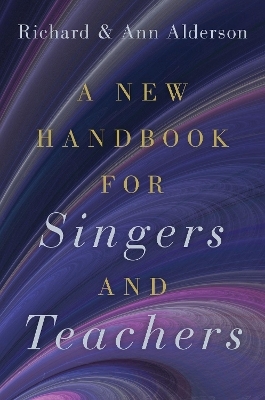
A New Handbook for Singers and Teachers
Oxford University Press Inc (Verlag)
978-0-19-092044-9 (ISBN)
The practices of singing and teaching singing are inextricable, joined to each other through the necessity of understanding the vocal art and craft. Just as singers must understand the physical functions of voice in order to become musically proficient and artistically mature, teachers too need to have a similar mastery of these ideas - and the ability to explain them to their students - in order to effectively guide their musical and artistic growth.
With this singer-instructor relationship in mind, Richard and Ann Alderson's A New Handbook for Singers and Teachers presents a fresh, detailed guide about how to sing and how to teach singing. It systematically explores all aspects of the vocal technique - respiration, phonation, resonance, and articulation - with each chapter containing exercises aimed at applying and teaching these principles. Beyond basic vocal anatomy and singing fundamentals, the handbook also covers such understudied topics as the young voice, the changing voice, and the aging voice, along with helpful chapters for teachers about how to organize vocal lessons and training plans. Thoughtfully and comprehensively crafted by two authors with decades of singing and teaching experience between them, A New Handbook for Singers and Teachers will prove an invaluable resource for singers and teachers at all stages of their vocal and pedagogical careers.
Dr. Richard Alderson, professor emeritus of voice and opera, served thirty years in the School of Music of Northwestern University. Dr. Alderson has also been an active professional opera director, conductor, and singer. He is also a well-known authority on vocal techniques and styles. He received his Doctor of Music degree in Voice and Opera from Northwestern University. Dr. Ann Alderson has been a professional singer and voice teacher for over thirty years. Dr. Alderson holds a Doctor of Music in Voice and Opera from Northwestern University. As well as being an active professional singer and conductor, she has been a frequent adjudicator for vocal and choral competitions at all levels, including the Metropolitan Opera Auditions and Society of American Musicians.
PART ONE: HOW TO SING
Chapter 1: Introduction
Chapter 2: Respiration
Physical Elements of the Vocal Mechanism
Breathing to Sing
Types of Breathing
Develop Coordinated Breathing
Breathing and the Musical Phrase
Symptoms of Improper Breathing
Additional Breathing Exercises
Helpful Sports Analogies
Other Useful Analogies
Chapter 3: Phonation
Making the Proper Sound
Coordinating Respiration with Phonation
Initiating the Tone
Sustaining the Tone
Moving from Note to Note
Releasing the Tone
Finding and Refining the Proper Tone
Dealing with Nasality
Exercise Remedies for Nasality
Vocalises for Nasality
Vibrato
History of Vibrato
Dealing with Vibrato
Breathiness
Hoarseness or Huskiness
Harshness or Stridency
Muffled or Swallowed Tone
Hollow or Hooty Quality
Other Analogies
Chapter 4: Resonance
Types of Resonance
Vocal Resonators
Developing a Rich Voice
Respiration--Phonation--Resonance
Resonance Exercises
Chapter 5: The Singing Vowel
Instrumental Characteristics of Vowels
The Fixed Formant Theory of Vowels
Making a Proper Vowel Sound
Vowel Unification Vocalises for all Voices
Vowel Migration
Vowel Modification
Chapter 6: Registers and Registration
Dealing with Registers
Dealing with Registration
Changing Registers Smoothly: Males
Changing Registers Smoothly: Females
Chapter 7: Articulation
Making Sense out of Sound
Sung Language vs. Spoken
Articulation Exercises and Vocalises
The trouble with /R/
Special Problems of Articulation
Chapter 8: Fundamental Diction for Singers
Italian Diction
Rules of Pronunciation
Latin Diction
Rules of Pronunciation
French Diction
Vowels
Nasal Vowels
Semi-vowels and Glides
Consonants
Special Rules of Pronunciation
German Diction
Vowels
Diphthongs
Consonants
Some General Rules in Singing
The Glottal Attack
Ach-Laut and Ich-Laut
Special Rules for the Letter /G/
Chapter 9: Audition Strategies
General Principles
Physical Strategies
Psychological Strategies
Final Suggestions
PART TWO: HOW TO TEACH SINGING
Chapter 10: Basic Concepts of Voice Teaching
General Vocal Pedagogy
A Broad Technical Base
Instructional Cue Card
Using the Cue Card
Choosing Literature
Two Golden Rules
Style and Musicianship
Reinforcement
Expectations
If the Student is not Making Progress
Logistics
Length of Lesson
Setting a Price
Chapter 11: Organizing a Training Program
Determine the Level of the Singer
Listen to the Singer and Analyze the Performance
Apply Four Key Principles
Determine a General Training Plan
Determine a Logical Starting Point
Constructing Coordinated Lesson Plans
The Individual Lesson Plan
Communicating Information
General Benefits of Lesson Plans
Teaching Aids
Summary
Chapter 12: Basic Vocal Exercises
Using Basic Vocal Exercises
Warm-up Exercises
Skill Exercises
Selecting Exercises
Assigning Exercises
Incorporating Exercises and General Training
Specific Lesson Organization
Chapter 13: Teaching Breathing Techniques
A Concise Explanation of the Singing Breath: For Beginners
A Logical Presentation of the Breathing Process
A Concise Explanation of Interrelated Functions
A Sample Discussion of Inhalation
A Sample Discussion of Exhalation
Teaching the Techniques of Proper Respiration
Relating the Functions of the Singing Breath
Analyzing a Singer's Breathing Skills
Discussing Various Types of Breathing
Applying Appropriate Breathing Techniques
Correcting Errors
Breathing Exercises and Correlated Use
Chapter 14: Teaching Phonation Skills
Teaching Techniques of Phonation: Basic Principles
Vocal Registers
Teaching Different Genders
Further Considerations
How to Analyze Vocal Sound
How to Design a Training Program
Solutions Related to Visual Clues
Solutions Related to Audible Clues
Other Common Phonation Errors
Sample Phonation Exercises
Chapter 15: Training the Resonators
The Resonating System
Adapting the Resonators
Types of Resonance
Applying Vowel Modification
Vowel Modification Exercise Charts
Constructing the Charts
Establishing Register Changes
Applying Resonance Principles
Respiration Plus Resonance
Using Repertory to Train the Resonators
Resonance Problems and Solutions
Chapter 16: Teaching Articulation Techniques
Respiration + Phonation + Resonance + Articulation
Identifying Articulators and Specific Types of Movement
Importance of Training Articulation
Elements of Articulation
Teaching Articulation Techniques
Diction Considerations
Training the Articulators
Articulation Problems and Solutions
Final Elements of Articulation Training
Chapter 17: Teaching Young Changing Voices
Normal Angst
Principles for Teaching Young Singers
Fundamental Concepts
Repertory
Peer Reinforcement
Young Male Voices
Countertenors or Male Altos
Exercises Specific to Boys' Voices
Young Female Voices
Exercises Specific to Girls' Voices
Assigning Repertory
Chapter 18: Teaching Aging Voices
General Considerations
Physical Factors of Aging Voices
Psychological Elements Related to Singing
Specific Aspects of the Aging Voice
Technical Adaptations
Exercises and Correctives
Physical Fitness and Vocal Fitness
Final Considerations
| Erscheinungsdatum | 03.01.2020 |
|---|---|
| Zusatzinfo | 18 illus., 45 music ex. |
| Verlagsort | New York |
| Sprache | englisch |
| Maße | 243 x 160 mm |
| Gewicht | 685 g |
| Themenwelt | Kunst / Musik / Theater ► Musik ► Klassik / Oper / Musical |
| Kunst / Musik / Theater ► Musik ► Musiktheorie / Musiklehre | |
| ISBN-10 | 0-19-092044-0 / 0190920440 |
| ISBN-13 | 978-0-19-092044-9 / 9780190920449 |
| Zustand | Neuware |
| Haben Sie eine Frage zum Produkt? |
aus dem Bereich


